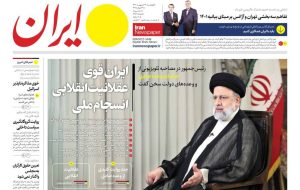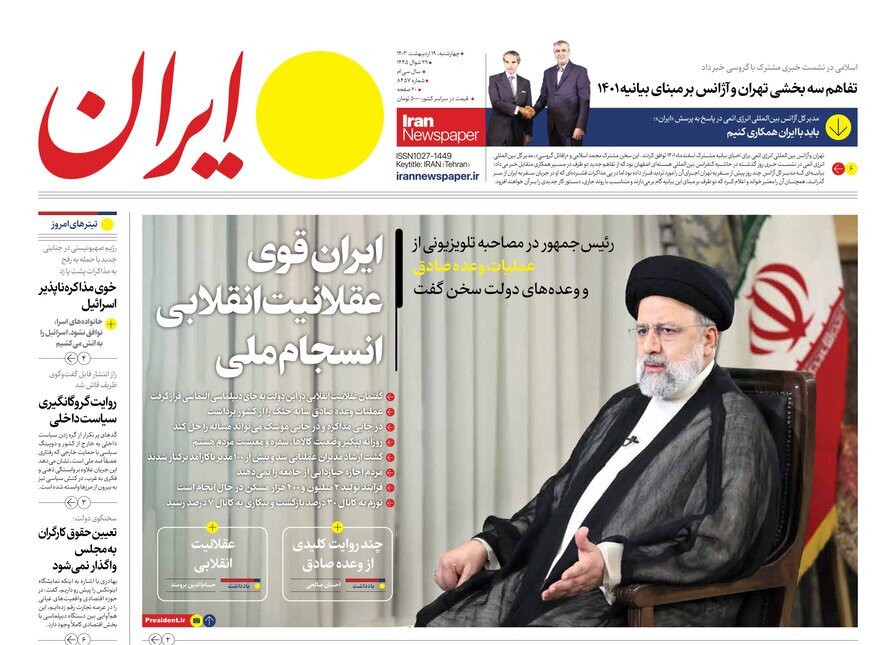Western contradictions toward protests in US and riots in Iran
TEHRAN – In a commentary, the Iran newspaper discussed the protests in America and wrote: Western media did not have an answer to the protests of students regarding the genocide of the Palestinian people by the Zionist regime, and they introduced them as anti-Semitic and supporters of terrorism. More than 10 days have passed since


TEHRAN – In a commentary, the Iran newspaper discussed the protests in America and wrote: Western media did not have an answer to the protests of students regarding the genocide of the Palestinian people by the Zionist regime, and they introduced them as anti-Semitic and supporters of terrorism.
More than 10 days have passed since the beginning of protests by students of American and European universities against the crimes of the Zionist regime in Gaza. The students only want to stop the support of the United States for the crimes of the Zionist regime and to end the genocide of the Palestinian people, but these peaceful protests cannot be tolerated by the Western governments and media. In addition, the pro-Zionist media is trying to introduce the protesters against Israel’s crimes as anti-Jewish and their protest as anti-Semitism. Western media reacted to the students’ protest and supported their suppression by the police, but these media during the riots of “women, life, freedom” introduced the people who sought to sabotage with maximum violence as brave, fighters and wise young people.
Siasat-e-Rooz: The power of the West Asia region centered on Iran
Siasat-e-Rooz in its editorial pointed out the visit of the President of the Kurdistan Region Barzani to Tehran. The paper said: Although the relations between Iran and Kurdistan of Iraq have had many ups and downs, they are indebted to the Islamic Republic of Iran. In difficult situations, it was Iran that saved them and did not allow them to be in a critical situation. The most important of which is to confront ISIS, however, many times the anti-revolution forces settled in Kurdistan took action against Iran. Also, the Zionists settled in this region are also active against Iran, which cannot be tolerated by Islamic Iran. Israel and the anti-revolution forces of Komala and the Democrats based in this region were not good allies for them, and there was no help from them when ISIS attacked. The goal of the Zionist regime which Komala and the Democrats take orders from, is disintegrating Iraq, a disintegration that will cause problems for Islamic Iran. In any case, Barzani’s trip to Iran at this point shows that they have realized what is happening in the West Asia region centered on Iran.
Ham Mihan: America’s effort is to isolate Iran in the region
In an analysis, Ham Mihan discussed America’s efforts for a new regional security order in the Middle East. It wrote: The plan of America is to ensure the security of Israel and its allies and isolate Iran in the region. The security goal is to deal with Iran’s threats, to weaken Iran’s military power as much as possible, and to prevent the destruction of Abraham’s and two-state peace plans. The leaders of the Zionist regime are also looking for Washington’s support. Achieving this goal (weakening Iran’s military power) requires confronting proxy groups as well as confronting the nuclear and missile program of the Islamic Republic of Iran. Israeli leaders demand the presence of the United States in any military confrontation with Iran and consider the current situation in the Middle East as an opportunity to realize this strategic goal. We still believe that involving the U.S. in a military confrontation with the Islamic Republic of Iran is the most important goal of Israel in expanding the crisis in the region, a goal that Israel has pursued for a long time. But the most important obstacle to establishing this order is the military power of the Islamic Republic of Iran and its allies.
Hamshahri: The promising prospect of Tehran-IAEA negotiations
In an interview with Hasan Beheshtipour, a senior expert on international issues, Hamshahri addressed Grossi’s trip to Tehran and said: Some analysts believe that the positions raised by Grossi and Eslami during a press conference in Isfahan show that Iran and the IAEA are taking important steps towards strengthening cooperation and solving some ambiguities, an issue that can ultimately create a promising prospect in the context of resuming negotiations of lifting sanctions. If Iran and the Agency can find a positive solution to solve the remaining problems and ambiguities, that is the time when we can hope for the future. We must consider that we are in a position of power to advance the negotiations in the current situation. Now, on the one hand, Iran has the upper hand in regional relations, and on the other hand, Iran has a favorable situation in terms of enriched uranium reserves. So, we are fully ready for negotiation. If the cooperation between Iran and the IAEA moves in the right direction and appropriate steps are taken to clear the ambiguity about the two alleged locations of the IAEA, it will be a start to revive the negotiations of lifting sanctions.
